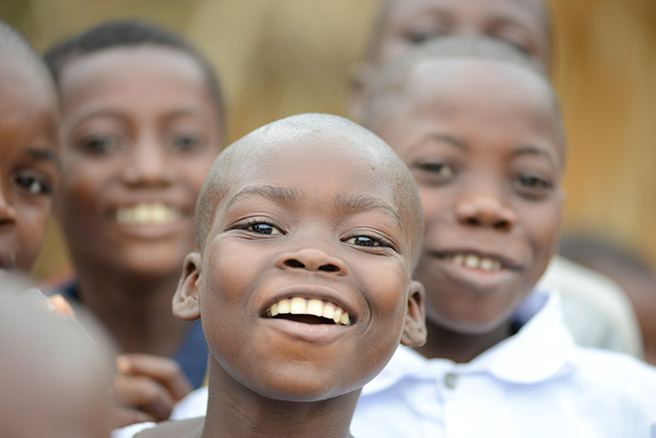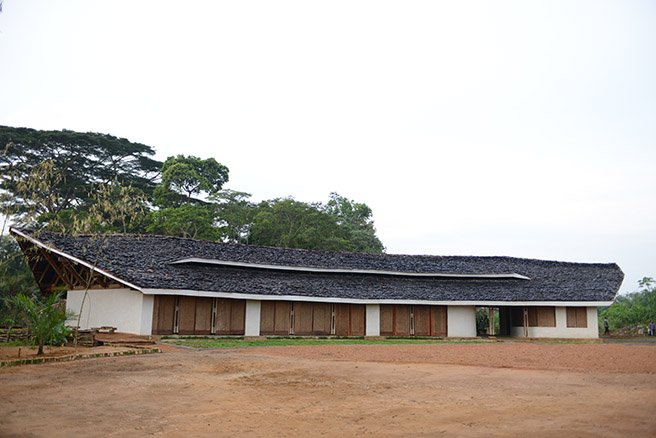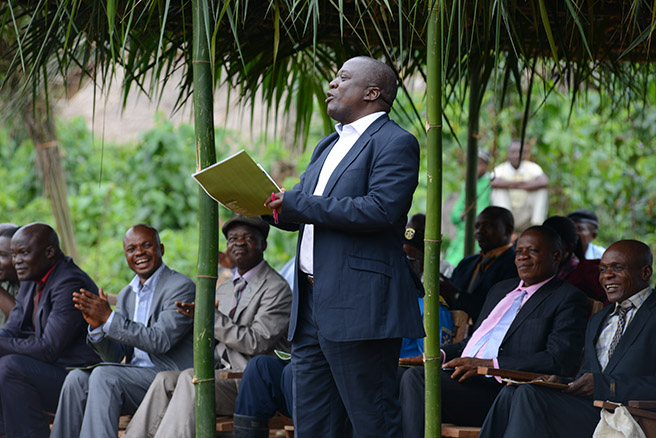A New Beginning

I always have a nervous sense of anticipation when I plan a trip to the interior of the Democratic Republic of Congo—more so than any other field trip for AWF. I love going to the Congo to visit our programs and field staff. The area is so remote, so rural and so unusual. DRC trips are always an adventure.
But this particular trip was special. As the new managing director of Classroom Africa, I was traveling with AWF’s CEO Dr. Patrick Bergin, and other staff, to participate in the official opening of the Ilima Conservation Primary School in the middle of the Maringa-Lopori-Wamba landscape. The Ilima School is the first site fully designed, constructed and supported under Classroom Africa.
It was indeed an honor to be representing Classroom Africa, and the entire AWF organization, on such a meaningful occasion. As I watched the smiling faces of the girls and boys during the opening ceremony—they danced and sang and generally ran around the new campus with enthusiasm—I knew that I had transitioned to this role with a purpose, a heartwarming and impactful purpose.
Prior to this role, I was AWF’s director of Conservation Enterprise. These two roles, with very different activities and programs, are uniquely similar in their intended impact. Much of AWF’s conservation efforts are focused on working with local, often rural, communities to help protect and conserve their local environment, and the wildlife that depends on that environment. AWF has always sought to provide incentives to communities and their members, to encourage participation and offset the cost of changing behaviors. Historically, that incentive mechanism has been rooted in economics. Increased income—through tourism, agriculture and other business development initiatives—has been the driving force.

The new Ilima Conservation Primary School.
However, beyond income, many communities voice a desire for access to better education for their youngest members. The educational systems in many countries are stretched, and ministries of education are often faced with an endless list of needs and limited budget to address those needs. Rural school systems are typically less of a priority than their urban counterparts, and this is precisely the opportunity for AWF and its schools' program to help bridge the gap in needs and promote conservation at the same time.
AWF has long been involved in education at various levels and capacities. With the schools' program, we are focusing the educational interest as a community incentive, providing improved facilities, teacher training, conservation education and general school support to primary school students in rural communities. As a conservation-programming element, schools are yet another tool that we can use to help further the protection and preservation of critical ecosystems and their species.
And there aren’t too many species on the continent that are as critically endangered as the beloved bonobo. Between habitat loss and poaching, the bonobo is one of the four great ape species under threat. Ilima is one of the many communities that sits in the midst of bonobo territory; working with the community and government agencies to rebuild a dilapidated school provided an additional incentive to protect the bonobo habitat, and build the link between education, community and conservation.
The journey began two years ago, and this trip was the culmination of that journey.
The Ilima campus was designed with core principles: easily maintainable buildings constructed with locally available materials; construction techniques and site layout that address climatic conditions; quality teacher’s housing to attract and retain skilled educators; and campuses informed by local culture and traditions.

The grand opening of the Ilima School was filled with excitement and enthusiasm—attendees realized this is truly a special place.
The result is a light-filled, fun place to learn, with inside and outdoor learning spaces that provide children with opportunities for hands-on appreciation of their environment. What I saw was a student body that was just thrilled with its new school. The students may not yet fully appreciate all the unique elements of the campus, but they know that their new school is special.
The parents and teachers know that Ilima is a special school.
The Ministry of Education and the Ministry of Environment know that Ilima is a special school.
I am simply proud of AWF and what we are able to achieve.
When I transitioned from the conservation enterprise program to schools, I don’t think I ever fully anticipated the emotional attachment and the responsibility that weighs when one thinks about constructing a new school and improving the quality of education. I am now beginning to appreciate the magnitude of the impact that we can have on children’s lives, and the environment in which they live.
As I told the students and everyone gathered at the school ceremony, the opening of the school is not the end but only the beginning.
We will continue to support the Ilima Conservation Primary School through teacher training, conservation education programming and other general support to ensure the campus continues to provide the quality education and conservation awareness that we intended. If the smiles and cheers were any indication, we have a good start.
Photos by Billy Dodson
